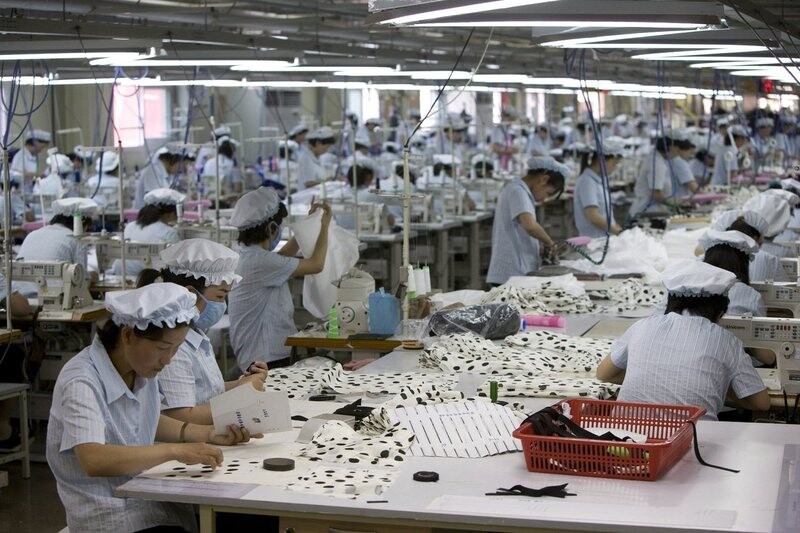hankyoreh
Links to other country sites 다른 나라 사이트 링크
8 out of 10 South Korean trading companies willing to partake in inter-Korean projects

Eight out of ten South Korean trading companies intend to take part in projects with North Korea if inter-Korean trade resumes going ahead, a survey shows.
The Institute for International Trade (IIT), affiliated with the Korea International Trade Association (KITA), released findings on June 17 on a survey of “trade business perceptions on inter-Korean trade,” for which 1,176 businesses were questioned. The results showed 80.0 percent of businesses answering that they intended to participate in projects with North Korea if inter-Korean trade resumes.
As reasons for wanting participate, companies cited “new business opportunities including general trade” (36.1 percent), “taking advantage of a low-wage workforce” (25.1 percent), “participating in road, electricity, and other infrastructure development projects” (12.5 percent), and “improving advancement into China’s three northeastern provinces and other neighboring markets” (11.7 percent). The area most commonly given as having promising prospects was “infrastructure, construction, and resources” (35.1 percent), followed by “electricity, electronics, communications, and machinery” (17.3 percent), “tourism” (15.3 percent), “textiles, clothing, and everyday items” (13.5 percent), and “steel, metals, and chemical products” (10.6 percent).
Companies that said they do not intend to participate in North Korea projects cited reasons including “a lack of necessary information and education on North Korea projects” (22.0 percent), “controls and interference by North Korean authorities” (18.6 percent), “changes in administration’s economic policies regarding North Korea” (13.7 percent), “sanctions against North Korea by the US, UN, and international community” (11.6 percent), and “difficulties achieving restitution for damages, including insurance and dispute resolution” (10.0 percent).
As priority tasks for the administration promising private inter-Korean trade, companies listed “establishing the conditions for stable and sustainable trade” (34.6 percent), “winning support from the international community and cooperating on North Korea projects” (15.8 percent), and “smooth communication between South and North Korean businesses and resolution of indirect trade method issues through the National Economic Cooperation Federation” (13.5 percent).
In terms of the economic effects of improved inter-Korean relations, 86.7 percent of respondents said they had been “very positive” (46.9 percent) or “positive” (39.8 percent), while just 3.9 percent rated them as “negative” (2.8 percent) or “very negative” (1.1 percent).
Respondents most commonly predicted inter-Korean trade by private companies would resume within four to five years (31.7 percent), while some predicted it could start as early as this year (9.6 percent) or next year (22.3 percent).
By Choi Ha-yan, staff reporter
Please direct comments or questions to [english@hani.co.kr]

Editorial・opinion
![[Guest essay] The real reason Korea’s new right wants to dub Rhee a founding father [Guest essay] The real reason Korea’s new right wants to dub Rhee a founding father](https://flexible.img.hani.co.kr/flexible/normal/500/300/imgdb/original/2024/0423/8317138574257878.jpg) [Guest essay] The real reason Korea’s new right wants to dub Rhee a founding father
[Guest essay] The real reason Korea’s new right wants to dub Rhee a founding father![[Column] ‘Choson’: Is it time we start referring to N. Korea in its own terms? [Column] ‘Choson’: Is it time we start referring to N. Korea in its own terms?](https://flexible.img.hani.co.kr/flexible/normal/500/300/imgdb/original/2024/0423/3617138579390322.jpg) [Column] ‘Choson’: Is it time we start referring to N. Korea in its own terms?
[Column] ‘Choson’: Is it time we start referring to N. Korea in its own terms?- [Editorial] Japan’s rewriting of history with Korea has gone too far
- [Column] The president’s questionable capacity for dialogue
- [Column] Are chaebol firms just pizza pies for families to divvy up as they please?
- [Column] Has Korea, too, crossed the Rubicon on China?
- [Correspondent’s column] In Japan’s alliance with US, echoes of its past alliances with UK
- [Editorial] Does Yoon think the Korean public is wrong?
- [Editorial] As it bolsters its alliance with US, Japan must be accountable for past
- [Guest essay] Amending the Constitution is Yoon’s key to leaving office in public’s good graces
Most viewed articles
- 1[Guest essay] The real reason Korea’s new right wants to dub Rhee a founding father
- 2Why Korea shouldn’t welcome Japan’s newly beefed up defense cooperation with US
- 3Terry Anderson, AP reporter who informed world of massacre in Gwangju, dies at 76
- 4[Column] ‘Choson’: Is it time we start referring to N. Korea in its own terms?
- 5[Column] The clock is ticking for Korea’s first lady
- 6Opposition calls Yoon’s chief of staff appointment a ‘slap in the face’
- 7Senior doctors cut hours, prepare to resign as government refuses to scrap medical reform plan
- 8New AI-based translation tools make their way into everyday life in Korea
- 9[Editorial] Japan’s rewriting of history with Korea has gone too far
- 10[Column] Are chaebol firms just pizza pies for families to divvy up as they please?